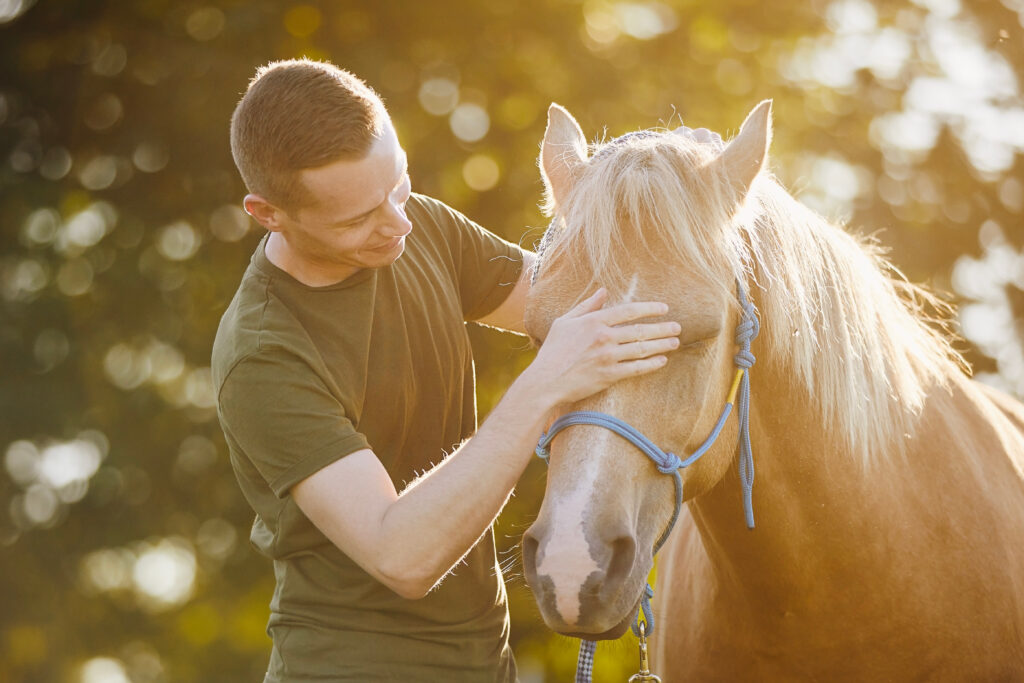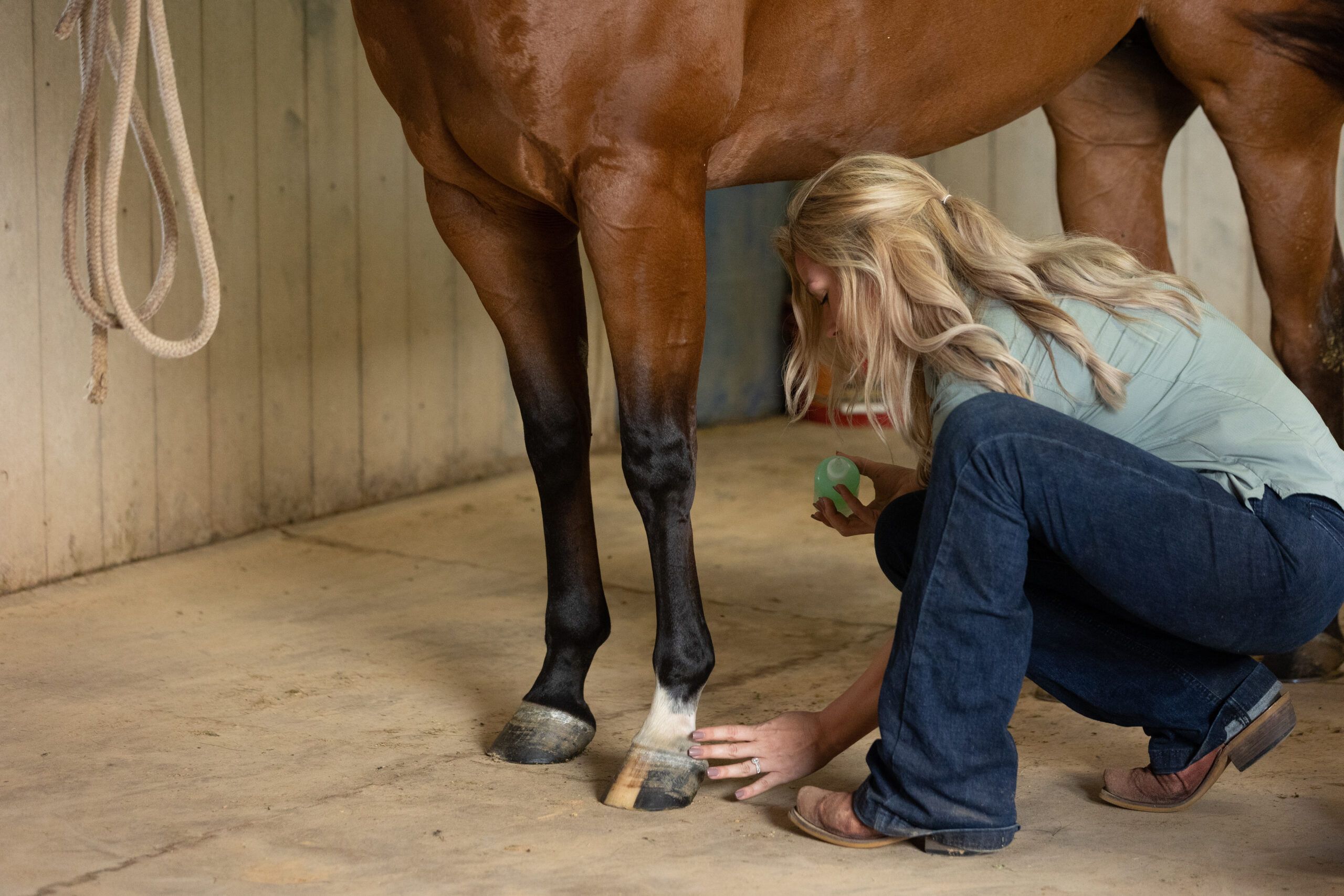Understanding Equine Therapy
Equine therapy is more than just spending time around horses. This approach uses guided activities with horses to support mental, emotional, and physical growth in people of many backgrounds.
Led by professionals, sessions often take place in calm settings where safety and respect for both horse and guest are prioritized.
One of the most important aspects of equine therapy is the relationship between the person and the horse. Horses are highly sensitive to body language and emotions, which means guests receive honest, immediate feedback to their own feelings and actions.
Learning to communicate clearly and kindly with a horse helps build trust, patience, and self-confidence.
Key benefits of equine therapy include:
- Emotional Awareness:
- Horses do not judge; they respond to what is happening in the moment.
- When a person feels upset, nervous, or happy, the horse often reacts in ways that help the person notice and identify their emotions.
- This process can improve skills for managing strong feelings, which is especially helpful for those dealing with mood swings, anger, or sadness.
- Nonverbal Communication:
- Horses rely on body language rather than words, so guests learn to pay close attention to subtle cues.
- Over time, this helps people better read the behavior of both horses and humans, making social situations less stressful and easier to navigate.
- Mindfulness:
- Horses live in the present and are highly attuned to what is happening right now.
- Being with a horse encourages people to focus on the present moment, which can lower stress and promote a sense of calm.
- This is especially beneficial for those who struggle with worry or racing thoughts.
- Assertiveness and Boundaries:
- Horses have clear boundaries and will react if they feel threatened or disrespected.
- Participants must learn to express their needs in a clear and gentle way.
- Practicing this with horses can help people become more assertive and respectful of boundaries in their relationships.
- Problem-Solving and Teamwork:
- Many equine therapy activities require creativity and planning.
- Some tasks are done in groups, encouraging communication and cooperation.
- These experiences often foster a sense of pride and accomplishment.
- Physical Activity:
- Equine therapy involves grooming, feeding, and cleaning, which supports core strength, balance, and overall fitness.
- This physical engagement can help people feel better in their bodies and is especially beneficial for those with disabilities or sensory processing challenges.
| Skill | How it Helps |
| Trust and Connection | Builds confidence, self-esteem |
| Emotional Awareness | Improves feeling recognition |
| Nonverbal Communication | Boosts social and observation skills |
| Mindfulness | Reduces stress, improves focus |
| Assertiveness | Strengthens boundaries, self-advocacy |
| Teamwork | Fosters cooperation and problem-solving |
| Physical Engagement | Aids balance, core strength |
Mental Health Concerns Addressed with Horse-Involved Treatment
Equine-assisted therapy is used for many different conditions. The approach can be tailored to meet a wide range of needs.
People with mental health challenges may benefit from this therapy. Conditions like anxiety, depression, bipolar disorder, and PTSD often involve negative thoughts, trouble with trust, or low self-esteem.
Spending time with horses and developing a new bond can help people gain confidence and regulate emotions.
Addiction recovery programs often use equine therapy as one part of a larger plan. The trust built through caring for a horse gives many individuals a new sense of purpose. Activities support self-worth and achievement, which are important for people working to stay sober.
For trauma survivors, equine therapy offers a safe space to practice trust without fear of judgment. Horses help people stay focused and grounded, which can make it easier to work through painful experiences at a safe pace.
Equine therapy has also been shown to support people with eating disorders. Focusing on caring for another living being shifts attention away from appearance or weight and towards building positive self-esteem. Grooming, leading, and communicating with a horse can help change unhealthy thinking patterns.
ADHD is another condition where equine therapy can be helpful. Sessions encourage children and adults to follow instructions, work with others, and stay on task. The movement and structure of each activity can reduce impulsive behavior and help guests practice better focus.
Equine-assisted activities are also commonly used to address autism spectrum disorder. Horses are predictable and often easier to communicate with than people.
Nonverbal children and adults can enjoy the benefits of shared activities and practice social skills in a gentle, low-pressure environment.
Key conditions addressed by equine therapy include:
- Mental health issues (anxiety, depression, PTSD, bipolar disorder)
- Addiction recovery
- Trauma recovery
- Eating disorders
- ADHD
- Autism
Equine-assisted psychotherapy offers unique support, and the blend of physical movement, communication practice, and emotional connection creates wide-reaching benefits for many people.

Why Select Thoroughbred Wellness and Recovery for Horse-Assisted Therapy in Atlanta?
Thoroughbred Wellness and Recovery offers a unique blend of horse-assisted therapy and scientifically supported treatments for people facing addiction and mental health issues. Clients take part in activities with horses designed to develop skills like patience, awareness, and emotional control. Horses respond authentically, creating opportunities for participants to learn about communication and trust. These sessions can help improve confidence, resilience, and relationships with others.
The team provides flexible care options, allowing for treatment both in groups and individually. For those who prefer a different therapy route, horse-assisted sessions remain optional. This means each guest can shape their own healing experience.
Therapeutic approaches like psychodrama, EMDR, ART, and RRT are included in service plans, ensuring treatment is well-rounded and can be adapted to each person’s needs. This variety allows every individual to find the best combination of therapies for their situation.
| Benefits of Equine Therapy | Examples |
| Improved emotional regulation | Managing strong feelings in daily life |
| Increased self-confidence | Feeling capable in new and challenging situations |
| Enhanced communication skills | Expressing needs and feelings more effectively |
| Reduced anxiety and stress | Learning to stay calm and focused under pressure |
Accessibility and Commitment to High Standards
Thoroughbred Wellness and Recovery is dedicated to making horse-assisted therapy accessible across Atlanta. Different levels of care are offered, such as residential, PHP, IOP, and outpatient options, so guests can receive support that fits with their lifestyle and recovery path.
We follow strict safety and ethical rules. All horse-assisted activities are guided by skilled professionals with years of experience in the field. The team is committed to providing a safe, supportive space for growth and recovery, ensuring guests receive effective help at every step.
Other Mental Health Therapies
These therapies offer diverse approaches to mental health treatment, allowing individuals to find the methods that best suit their needs and preferences.
- Psychodrama Therapy is an experiential form of therapy where guests use role-playing, dramatic self-presentation, and group dynamics to explore and resolve personal issues. By acting out situations from their lives, individuals can gain new perspectives, process emotions, and practice healthier responses in a safe, supportive environment.
- Accelerated Resolution Therapy (ART) is a brief, evidence-based therapy that uses eye movements and guided imagery to help guests quickly process and resolve traumatic memories or distressing experiences. The technique aims to reduce the emotional impact of difficult memories, often in just a few sessions, while allowing guests to maintain control over what they share.
- Rapid Resolution Therapy (RRT) is a short-term therapy designed to help people overcome the effects of trauma, anxiety, and other emotional difficulties. It combines elements of hypnosis, cognitive restructuring, and guided imagery to clear the emotional charge of troubling memories, often leading to rapid and lasting relief.
- EMDR Therapy (Eye Movement Desensitization and Reprocessing) is a structured therapy that helps individuals process and heal from trauma and other distressing life experiences. Using bilateral stimulation, such as guided eye movements, EMDR helps the brain reprocess traumatic memories, reducing their emotional intensity and assisting guests to move forward.
- Cognitive Behavioral Therapy (CBT) is a widely used, evidence-based approach that identifies and changes unhelpful thought patterns and behaviors. Through structured sessions, guests learn practical skills to challenge negative thinking, manage stress, and develop healthier coping strategies for various mental health concerns.
- Dialectical Behavioral Therapy (DBT) is a specialized form of CBT that emphasizes balancing acceptance and change. It is particularly effective for individuals with intense emotions, self-harming behaviors, or borderline personality disorder. DBT teaches skills in mindfulness, emotional regulation, distress tolerance, and interpersonal effectiveness.
- Trauma Therapy encompasses a range of approaches designed to help individuals process and recover from traumatic experiences. Techniques may include talk therapy, somatic therapies, and trauma-focused cognitive therapies, all aimed at reducing symptoms of post-traumatic stress and improving overall well-being.
- Holistic Therapy takes a whole-person approach, addressing the mind, body, and spirit. We may incorporate traditional talk therapy with complementary practices such as mindfulness, yoga, and creative arts. The goal is to promote balance, self-awareness, and healing on multiple levels.

Recovery Can Begin Today
If you or a loved one are ready to explore the benefits of equine therapy or other mental health treatments, reach out to Thoroughbred Wellness and Recovery today. Our team is here to answer your questions, discuss your needs, and help you find the right path to lasting wellness.
Contact us now at 770-564-4856 to schedule a consultation and begin your journey toward a healthier, more fulfilling life.










